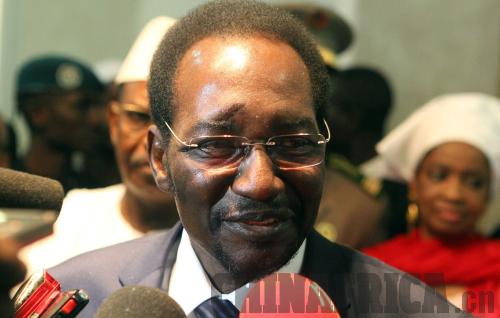| 2012 is one year that the African continent will be in a hurry to forget.
Though the usual headlines of hunger and disease have been fewer and less prolific, their ubiquitous twins of conflict and turmoil have been high on the news radar. The shameful of military coups also made a return to the headlines.
 |
|
Mali's interim President Dioncounda Traore (XINHUA/AFP) |
Change and more changes
Within one year, the presidents of four African countries died. In January, Guinea Bissau's Malam Sanha died at the age of 64. In April, just four short months later, Malawi's Bingu wa Mutharika succumbed to a cardiac arrest that ended his life. He was 78 years old. Toward the end of July, Ghana's John Atta Mills passed on from throat cancer at 68. Ethiopia's President Meles Zenawi died a few weeks later, in August, at 57. His handlers said he'd died of a "sudden infection."
These deaths plunged their countries into the murky waters of political transition.
Guinea Bissau went through a coup between the first and second round of the elections in April. Since then, the country has been living under a shadow of coups and counter-coups, compounded by an outbreak of cholera. The political instability is a huge magnet for the drug trade as the Integrated Regional Information Networks – the UN's humanitarian news and analysis body – reported drugs are arriving in that country in huge loads.
All eyes are on April 2013, when the curtain falls on the leadership of the interim leader, Manuel Serafo, and fresh elections hopefully bring stability.
But just as Guinea Bissau was descending into chaos, that same month, Malawi's Vice President Joyce Banda was elevated to be the country's head of state, becoming the second female president in Africa. Banda was quick to drop the opulence of her predecessor and has made up with the IMF to unlock the flow of foreign currency into the formal banking market, even though, as a condition, she was forced to devalue the Malawian currency – the kwacha – by up to 50 percent. Banda is famously quoted as saying: "Africa is changing in that regard and we are doing better than most countries. America is still struggling to put a woman in the White House, but we have two, so we're doing fine," referring to herself and Liberian President Ellen Johnson Sirleaf.
Ghana and Ethiopia are holding their countries together, and they are quietly looking forward to a stable 2013, after the political vagaries of transition are sorted out within the ruling party (in Ethiopia) and through elections (in Ghana).
The coup in Mali received extensive media coverage in 2012. Threats of secession of northern Mali – the region currently under the total control of militant Al Qaeda in the Maghreb – are real and worrying, as was the wanton destruction of historical tombs in Timbuktu. The coup not only showed the frailty of African electoral democracies, but it also revealed the domino effect of the North African "Arab Spring" in those countries of the Sahel region.
Looking behind the ongoing turmoil in many African countries, Moeletsi Mbeki, one of South Africa's most prominent and widely quoted commentators, didn't mince his words when asked by allafrica.com in November what his major critique of today's leaders in Africa is. "Most of Africa's ills come down to poor governance, to single party dominance. This is what is behind the mass poverty in Africa. Ironically, that means we need more political parties – because that's how you introduce competition in our governance system."
|